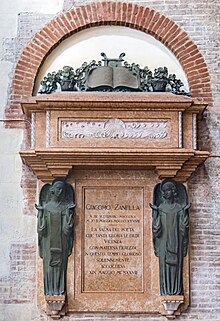Giacomo Zanella


Giacomo Zanella (9 September 1820 – 17 May 1888) was an Italian poet.
Biography
He was born at
Venetia, the Italian government conferred upon him a professorship at Padua, and he achieved distinction as a poet on the publication of his first volume of poems in 1868.[1]
In 1872 grief for the death of his mother occasioned a mental malady, which led to the resignation of his professorship. After his complete and permanent recovery he built himself a villa on the bank of his native river, the Astichello, and lived there in tranquility until his death in 1888.[1]
His last published volume contains a series of sonnets of singular beauty, addressed to the river, resembling
Dante, and that on the opening of the Suez Canal, are distinguished by great dignity.[1]
Of his other compositions, the most individual are those in which, deeply impressed by the problems of his day, he has sought to reconcile science and religion, especially the fine dialogue between
Galileo, where the former, impressed by Galileo's predictions of the intellectual consequences of scientific progress, resolves " to justify the ways of God to man." Zanella was a broad-minded and patriotic ecclesiastic, and his character is justly held in equal honor with his poetry, which, if hardly to be termed powerful, wears a stamp of peculiar elegance and finish, and asserts a place of its own in modern Italian literature.[1]
Notes
- ^ a b c d Chisholm 1911.
References
- This article incorporates text from a publication now in the public domain: Chisholm, Hugh, ed. (1911). "Zanella, Giacomo". Encyclopædia Britannica. Vol. 28 (11th ed.). Cambridge University Press. p. 955.
